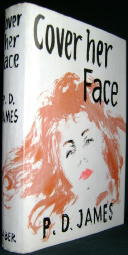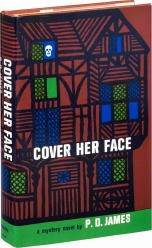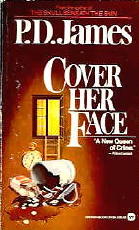Sun 28 Dec 2008
TMF Review by William R. Loeser – P. D. JAMES Cover Her Face.
Posted by Steve under ReviewsNo Comments
by William R. Loeser
P. D. JAMES – Cover Her Face. Faber & Faber, UK, hardcover, 1962. Charles Scribner’s Sons, US, hc, 1966. Reprinted many times in both hardcover and paperback.

P. D. James is looked upon as the Sayers-Christie-Allingham of our time, and I have, I hope, made the mistake of reading her first book, Cover Her Face twice and her others not at all. I say I hope I’ve made a mistake, for this for this title is not a detective story and abounds in wrongheaded ideas.
The book begins with 40-50 pages of foreboding in the best tradition of a gothic. The story revolves around Sally Jupp, who has been rescued from the local home for unwed mothers to be the housemaid at the country house Martingale by the materfamilias, Mrs. Eleanor Maxie.
The rest of the household consists of the comatose Mr. Maxie; widowed daughter Deborah Riscoe; usually, her diffident suitor, Felix Hearne; son Stephen, when he can get away from his duties as resident at a London hospital; and Catherine Bowers, a nurse who keeps inviting herself in hopes of embarrassing a proposal out of Stephen.
Sally makes herself unpopular by pranks against the loyal and long-serving housekeeper Martha and family members and produces the topper by announcing that Stephen has proposed to her. That night she is strangled in bed.

Chief Inspector Adam Dalgleish arrives on the scene and has to unravel a below-stairs plot and, the unlikely presence of two outsiders on the scene at the time of death.
All of this brings him little closer to a case that would convince a jury against the murderer, but Mrs. Maxie removes his difficulties by confessing she killed Sally to protect the family honor, adding that she had delayed her confession until her husband died, so he wouldn’t have to be taken to a nursing home.
The female characters are pictured as admirable for their ability to understand and cope with domestic crises without panicking. Stephen, on the other hand, is looked down upon for his idealism and lack of interest in these domestic trivia as evidenced by the fact that he goes back to work during the investigation.
That he is attempting to add to rather than live off, as they do, the family fund is ignored. Hearne is packed off to Canada, his fault being an understandable slightness of concern over the family’s difficulties after having had his fingernails extracted by the Nazis.

Sally, it turns out, had been robbed by her guardian and was married all along to a “nice young man,” who was off making his fortune in Venezeula. She had gone the unwed mother route to save money. Would that she had been permitted to live to stick a few more pins in these stuffed blouses.
The nice young man, poor devil, is allotted to the husband-seeking Catherine. Dalgleish, whom the author looks upon as God, is, aside from one reference to a dead wife and child, given as much personality as Dr. Priestly. At the end of the book we are led to believe he will mate with Deborah, his recommendation being, I suppose, that he sent her mother off to the Big House on the day her father died.
Maybe there is something to the book to cause such a violent and lengthy reaction.
[UPDATE] 12-28-08. I asked Bill earlier this month about the first sentence of his review. His reply:
“I recall that I did indeed read this book twice, although why I should have persisted the second time beats me! I still recall how much I disliked the book, so much so that I never attempted another by her.”